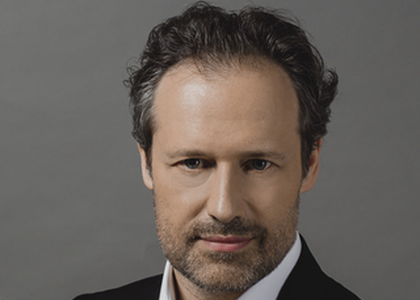> Interviews

Interview with conductor Sascha Goetzel
On Friday February 2nd, the Radio Music Season continues with a concert in which two of the Radio ensembles - the National Radio Orchestra and the Academic Choir, prepared by Ciprian Țuțu, will perform under the baton of Sascha Goetzel. The Austrian musician talked to our colleague Ioana Țintea about his return to the Radio Hall:
In an interview you gave to our station, you mention that you always aim to find a connection between all the music you present. For the concert on Friday February 2nd, how did you think of combining Mozart's Symphony No. 41 "Jupiter" with Bruckner's Missa in F minor?
Bruckner really studied all of Mozart's work, which was natural because we're talking about Vienna, Austria in the middle of the 19th century. At that time, Mozart had become very popular again, especially with his operas. But, besides that, there is a much deeper symbolism. In the latter part of his life, Mozart developed a kind of code of the tonal system. For example, if you look at Don Giovanni, there are two keys: G minor and D minor. Both tonalities signify the connection to the idea of fate and death. In the case of Bruckner's Mass in F minor, the parts suggesting death, divinity and destiny are closely linked to the keys used by the composer: D minor and G minor. So both works are directly connected to the tonal symbolism used by Mozart. And there is another aspect: "Jupiter", being his last work, is composed in C major, and Mozart, in the last years of his life, saw in this key an infinite universal language of all. So for him, this symphony is actually the work that connects the world and everything in the universe. About Bruckner it is known that he did not compose for mankind, but for the Divine. The beginning of the Mass suggests a dimension that is far from Earth, it is truly something spiritual. In addition, last week we celebrated Mozart's birthday; and when I have a concert around this day, I always try to include Mozart's works in the programme, and if I can add Bruckner I am very happy for this association. Through their music, we will have an infinite universal language starting from the physical world of Mozart and going to the spiritual world imagined by Bruckner.
How are the rehearsals going so far?
The rehearsals are going very well. We are working intensively on both works to find the right colours to explore this universe of possibilities when connecting the two worlds, physical and spiritual. Musicians get excited when we talk about this musical symbolism. We have motivic structures, articulation, phrasing, sound changes... Bruckner worked a lot with the organ when he was composing. The organ has many registers, and every time a new theme appears we have to imagine that these registers change. Bruckner suggests all these changes in the orchestral writing. This is what we are working on.
How do you describe your return to our country and how do you see the artistic relationship with Romanian musicians evolving over time?
For me it is a very beautiful journey. The first time I came to Romania was 20-25 years ago, I was quite young and Romanian musicians were close to me throughout my artistic career, they witnessed my human development. It's like in a relationship, at the beginning everything is like a surreal experience, but with time, an intense mutual respect comes in. We have gone through different stages together and now we have reached a deep moment in our artistic relationship. For us, music is a supreme form of communication, every note or phrase we play always has a meaning behind it. We want the audience to feel the story of life, humanity and the universe through our performances. For us that is the most important thing.
Translated by Bianca Daniela Penaru,
University of Bucharest, Faculty of Foreign Languages and Literatures, MTTLC, year I
Corrected by Silvia Petrescu














